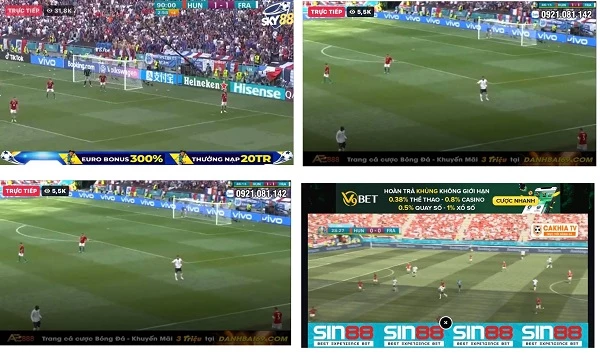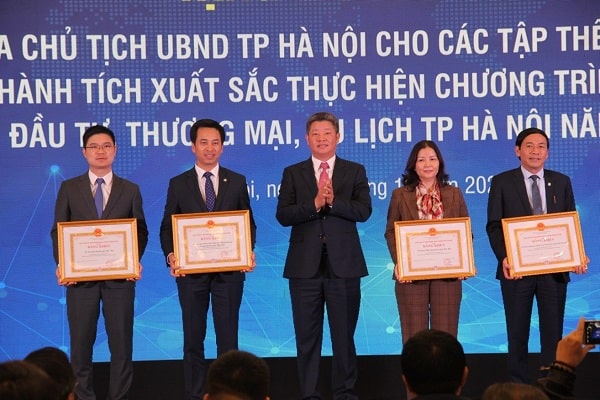Legal framework for copyrights protection of digital content in the Internet age
Covid-19: Grab’s passenger service will be suspended for 15 days, while GrabExpress, GrabFood, GrabMart are maintained / Race of Vietnam’s medical masks to rescue the "thirst" of Europe
The Digital Content Industry is being evaluated as a "new gold mine" that is setting up a new multi-billion-dollar industry in Vietnam. The Internet has become the dominant platform for providing digital content such as movies, music, books, news, and software. Vietnam Enterprise Magazine is now publishing a series of articles written by Nguyen Ngoc Han (CEO Thudo Multimedia) from the perspective of "copyright management and protection on the Internet". Throughout the articles, it will manifest the importance of copyright as an incentive mechanism for the establishment and dissemination of digital content.
Copyright is a legal concept that has evolved over more than three centuries. It is expressed in many international treaties, though the pace of updating laws in this field on a global scale is slowing. However, as previously stated, the technological revolution and its impact on creative content have significantly reshaped the regulatory environment for dealing with copyright issues. As a result, certain legal aspects may need to be re-expressed, and some countries have revised or attempted to amend copyright legislation. The majority of the country today will focus on five areas of copyright law in the Internet context, including: copyright restrictions and exceptions; scope of copyright; orphaned works (anonymous works); copyright protection; registration of intellectual property rights.
Limitations and Exceptions
At the heart of legal solutions in this area is technology that allows digital content to be easily copied and transported (exchanged).
One situation in which policymakers have imposed restrictions and exceptions is in the public interest when it comes to the reproduction of copyrighted content.
There are also exceptions and restrictions on the use of copyrighted material for research or research purposes, judicial proceedings, citation, criticism, or appraisal.
Copyright Scope
Copyright may apply to a variety of creative, intellectual, or artistic forms or "works" that vary by jurisdiction, but may include: poetry, dissertations, plays, and other literary works, motion pictures, choreography, musical compositions, sound recordings, live performances, paintings, drawings, sculptures, photographs, computer software, radio and television works, and industrial design.
In the context of technological advancement, it is critical to pay attention to data protection by copyright solutions. Because data has long been used in economic and social activities. Today, technology has enabled a shift to a data-driven socioeconomic model, in which data is a core asset capable of generating significant competitive advantage and driving innovation, growth, and innovation. development that is long-term (OECD, 2013b). Humans or machines can generate data (such as sensors that collect climate information, satellite images, digital images and videos, purchase motion records, GPS signals, etc.). It is generated in a variety of industries, ranging from healthcare to transportation and energy, and is stored in a database.
In the context of copyright, it is critical to distinguish between creative and non-creative databases because each has a unique set of legal rules. In general, copyright law protects creative databases in legal systems. Furthermore, some countries provide legal protection to non-creative databases by including them in copyright law or by granting sui (special rights) rights to protect non-creative databases.

Audiovisual piracy during UEFA EURO 2020.
Orphan works (anonymous works)
Orphaned works (anonymous works) are copyrighted works whose rights owner cannot be identified and/or found despite extensive searching.
The issue of orphan works (anonymous works) is not new, but the introduction of new technology has brought it to the forefront. Because of the global nature of the Internet and the ever-increasing volume of copyrighted content available online, determining the rightful owner of a particular copyrighted item is frequently impossible.
According to a report prepared for the British Film Institute (BFI), the reality is when the copyright holder cannot be identified or located. This means that archives, libraries, museums, broadcasters, commercial operators, and other media providers are unable to obtain permission to use orphan works (anonymous works), hampered digitization projects, and online access. Some orphaned works (anonymous works) have yet to be presented to the public because they are housed in public or private archives (KEA, 2011). There are also many cases of orphaned works (anonymous works) that are currently in digital libraries but are inaccessible due to the inability to determine the copyright of such materials (Iglesias, 2009).
Copyright enforcement
Because of the Internet's rapid growth, many people now have access to any type of news or data. This technological advancement, however, facilitates digital piracy by allowing users to distribute and exchange large amounts of technical products via websites and applications. On a global scale, there is instant piracy. As a result, technical piracy on the Internet has increased significantly as a result of this mode of transmission (OECD, 2009).
Piracy on the Internet is a significant and growing issue in many countries. According to the recent 301 Report of the United States Trade Representative, online piracy is a growing concern for virtually all copyright industries, in all formats, including electronic mobile phones, tablets, flash drives, and other portable technologies. Furthermore, new forms of piracy emerge, such as "gray markets" (piracy servers) - servers that provide cloud access for unauthorized users to play copyrighted games. This access is gained through the use of hacked software or the circumvention of technological safeguards (USTR, 2014).
A key factor in preventing digital piracy is each country's legal and regulatory framework, as well as regulations on the application of protection solutions. The legal system allows copyright holders to sue infringing parties and seek monetary compensation. A strong legal framework will aid in the reduction of digital piracy, whereas a weak legal framework may be perceived as lenient toward this type of activity, allowing piracy to flourish. The majority of studies also show that countries with strong copyright protection regimes have lower rates of piracy (Van Kranenburg and Hogenbirk, 2003; Das, Mukhopadhyay and Bagchi, 2014).
Furthermore, the risk of discovery and subsequent legal action (on repeat offenses) must be weighed against the potential consequences for violators in terms of the severity of any penalties. Imprisonment is expected or likely. For example, if the restitution penalty is insufficient, even if actions to prevent recurrence are insufficient, the law will have little practical impact on counterfeiting and piracy. This is a fairly common ailment in our country today.
There is a practical issue: digital piracy is generally not detectable at national borders. The flow of goods of “piracy” digital products is more difficult for law enforcement agencies to track because it is invisible from the seller, through the distributor, to the manufacturer, unlike the flow of physical goods. Because of this borderlessness, it also poses new challenges for effective international cooperation among law enforcement agencies.
The legal framework, on the other hand, is only valid to the extent that the law is put into practice. If there are not enough law enforcement agencies or if intellectual property rights are not enforced by public authorities, the value of nominal laws and regulations to rights holders is meaningless.
In fact, because the violation can occur in any geographical location, almost instantly, it is extremely difficult to track down the perpetrator. As a result, using punitive legal frameworks when committing crimes is largely ineffective. The inclusion of regulations on the use of piracy protections in the law, as well as clearly defining protection responsibilities for the core copyright protection industries, will aid in clarifying the response to the situation.
Copyright registration
The purpose of copyright registration is to keep a verifiable record of the date, owner, and content of the work in question, so that in the event of a legal claim or case of infringement or theft, the copyright owner can provide an official government agency with a copy of the work. Furthermore, under current circumstances, copyright registration can be viewed as one of the potential solutions to the problem of orphan works (anonymous works). According to some researchers, the rise in orphan works (anonymous works) is due to the fact that copyright issues are granted automatically without any registration process (Netanel, 2008).
Licensing should not be confused with copyright registration. Copyright is granted under the Berne Convention (1886) as soon as the work is published; registration does not enhance or modify the copyright in any way.
With the five areas related to copyrighted content on the platform mentioned above, as well as the analysis of the role of the digital economy and the importance of managing digital assets, it is necessary to supplement copyright regulations in the management of Internet-provided services, such provisions should, ideally, cover or (and) copyright-related areas such as: Limitations and Exceptions: Scope of Copyright; Orphaned works (anonymous works); Law Enforcement and Copyright Registration Regulations.
The author proposes to supplement Vietnam's regulations on copyright protection of digital content on the Internet, based on the arguments in four articles, with the following six contents:
1. It is necessary to equip measures against copying and unauthorized access to copyrighted content for websites, applications, or content distribution platforms on the Internet. In addition to ensuring the safety of digital content assets, enterprises providing content services on the Internet must also equip measures to record copyright infringement (log, or screen recording) to support legal support. Simultaneously, it is outfitted with solutions to track the number of times the product is used in order to make the use of intellectual property transparent.
2. Notice is required in writing to the copyright owners or core copyright unit in cases where it is used for public purposes (no charge of any kind), or for research, citation, criticism, appraisal, or judicial proceedings, indicating the source used on the works cited. The above-mentioned uses are only used once and have no derivative rights for other times or purposes.
3. To protect the ownership of the work, authors must make the first publication of the product in a suitable format and send it to the copyright-related authorities. The Ministry of Information and Communications' portal will be a channel through which authors can request access. Please include the necessary Author information in the submitted formats, in addition to the work, to serve the work of arrangement, search, and protection of rights.
4. For orphaned works, the Ministry of Information and Communications portal will be the location to collect works with base times (e.g. time of collection, update of works) as evidence for dispute (if any) later. It is proposed that the government develop a national property policy for orphaned works and works that have lost their Bern Convention protection as soon as possible.
5. The current scope of copyright protected digital content will be human-created content; digital content of non-human origin, such as (sensor data, satellite data), will not be protected; and the data will remain the private property of the businesses that own it.
6. In the event of copyright infringement, the units of the core industry that use the copyright will be liable for property loss and are governed by the provisions of the Intellectual Property law as well as international conventions on copyright protection to which Vietnam has signed.
End of content
Không có tin nào tiếp theo
